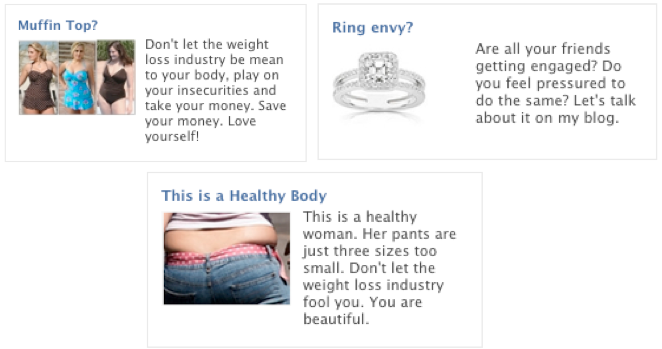Guest Post By Teresa Valdez Klein
Posted On February 10, 2013
When I went through my first big breakup my junior year of high school, I couldn’t get through a cat food commercial without bursting into tears. I felt so ashamed of myself for crying over someone who had moved right on to the next girl, and I didn’t want anyone to see me that way.
This happened right around the time that Bruce Willis and Demi Moore were parting ways, and I remember having a moment of real sympathy for them. Breakups are crappy enough without having your misery splashed all over every supermarket checkout line in America.
Now, we all get a bit of the celebrity breakup treatment; or at least we do if we’re one of the billion or so nodes on Facebook’s social graph. I learned how hard that can be when the pure bliss of sitting next to my college sweetheart as we jointly changed our relationship status from “in a relationship” to “engaged” was transformed about a year later to the utter misery of having to change it again, to “single.”
I was back to crying my way through commercial breaks and hiding from the world, except that this time, Facebook was going to make me announce the end of what was supposed to be my fairytale to everyone I had ever met.
As if that wasn’t hard enough, three months later – while I was sleeping in my brother’s old room, living out of boxes, and trying to keep my mom’s poodles from eating my cat – one of my best friends got engaged to the guy I had introduced her to in a crowded karaoke bar two years prior.
A tidal wave of engagements followed. I felt like I was the only person in the world who didn’t have someone. The News Feed became a torrent of ring photos and comments congratulating happy couples. I’m not totally insane, so I was aware that they didn’t time their happiness to my misery, but it was still an awful time for me, and Facebook was making it worse.
After all, nobody writes Timeline posts congratulating their friends on not marrying the wrong person or posts photos of their bare hands captioned “I didn’t like it, so I didn’t put a ring on it.” Literally all of the social support on Facebook, and in real life too, goes to the paired up people.
But the worst part of the Facebook experience at that difficult time in my life wasn’t that I had to watch all my friends be shiny, happy people while I was living with the teenage boy smell that inexplicably still permeated my temporary room.
It was the ads.
Because unlike Google’s ads, which are based on what you’re looking for in the moment, Facebook’s ads are targeted at you based on who you are. Advertisers are able to point their ads to you based on factors like your sex, your age, and your relationship status.
 Engaged women get ads for veils and local photographers. Women in relationships get ads for engagement rings. And single women get ads for dating sites and, occasionally, ads that say things like “alone again at 26? Learn the 10 mistakes you’re making that push men away.”
Engaged women get ads for veils and local photographers. Women in relationships get ads for engagement rings. And single women get ads for dating sites and, occasionally, ads that say things like “alone again at 26? Learn the 10 mistakes you’re making that push men away.”
Oh, and all women get ads for weight loss products. Lots and lots of weight loss products.
Relationship status actively aids the wedding industrial complex in its ceaseless quest to push us down the path to a $40,000 nuptial extravaganza. And more broadly, profile data aids all advertisers in continuing the constant process of making us feel inadequate, selling us a “fix,” and repeating ad nauseum.
Nobody is so well-positioned to see the flaws in a system as the outsider. At the time, that’s who I was, peeking in at all my friends enjoying the benefits of a club that I no longer belonged to. So to express my frustration, I started making my own Facebook ads.
I remixed ads that had particularly hurt me, like that one with the woman wearing pants three sizes too small for her that was helpfully captioned “muffin top?” I made ads telling women the things that I wished someone had said to me, things like “your body is beautiful” and “you don’t need to get married, or buy anything at all to have a happy life.”
I paid for those ads, and I sent them out into the world, linked to body image awareness sites, and blog posts I’d written decrying the second class status of single women. I made themed ads around single-shaming holidays like Valentine’s Day and Christmas. My goal was to remind everyone who saw my work to think critically about media, particularly when it’s selling something.
My ads have reached more than seven million women at this point, but I honestly have no idea whether this work has helped them. I do know it has helped me. Because making my own Facebook ads reminds me that I’m more than the little box that marketers try to put around me, and that what I create is more important than what I consume.
Tips for brands when marketing to single women:
- Do something to make your audience feel good about themselves, and they’ll associate feeling good about themselves with your brand.
- Break down or remix a stereotype so it sticks with people. The first detergent ad to feature a man doing three kids worth of grass-stained laundry will earn my business for life. Ditto for the first jeweler to feature a same-sex proposal or a lady proposing to her guy.
- Poke fun at other advertisers in a way your audience can relate to. The Kotex Natural Balance campaign that made fun of ads for other period-related products made me both laugh AND switch to Kotex.
- Give your audience the opportunity to make or remix your ads. The Dove Ad Makeover Campaign was utterly inspired for exactly that reason.
- When casting talent for a campaign, think outside the conventional beauty box. Here’s a great example: Sarah Robles, the highest ranked American weightlifter of either sex, does not have a single endorsement deal because she’s not conventionally sexy. This doesn’t make a lick of sense because every day, someone is trying to sell us a car strong enough to keep our families safe or deodorant strong enough to get us through an eighteen hour day. Nothing says strong like a woman who can dead lift an adult male lion. C’mon people, I want to see Sarah Robles in a commercial!
Meet Teresa Klein:
Tae Phoenix (also known as Teresa Valdez Klein) is a singer, songwriter, feminist, and geek living in Seattle, Washington. She recently released an album called “Rise” which is available for sale on iTunes and is working on a conference called Dent the Future that facilitates practical discussion of what it takes personally and organizationally to change the world.
MOST POPULAR:
- 5 Ways Technology Has Changed My Life (By Karen Zuckerberg)
- Dear Oversharing Parents…
- Can Technology Save Theater?
Like what you’re reading? Request an invite for more: http://dotcomplicated.co/















Leave A Comment
You must be logged in to post a comment.